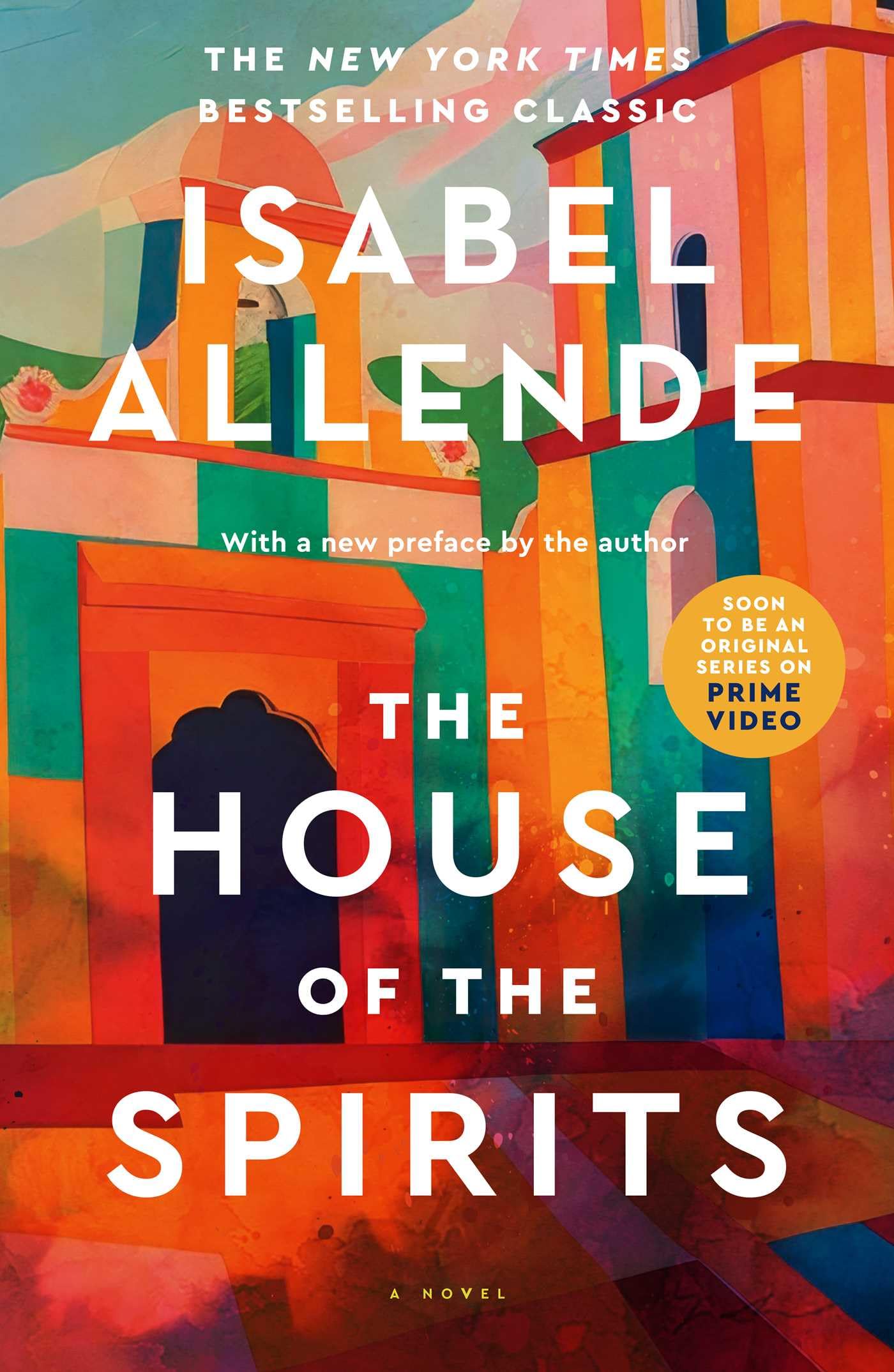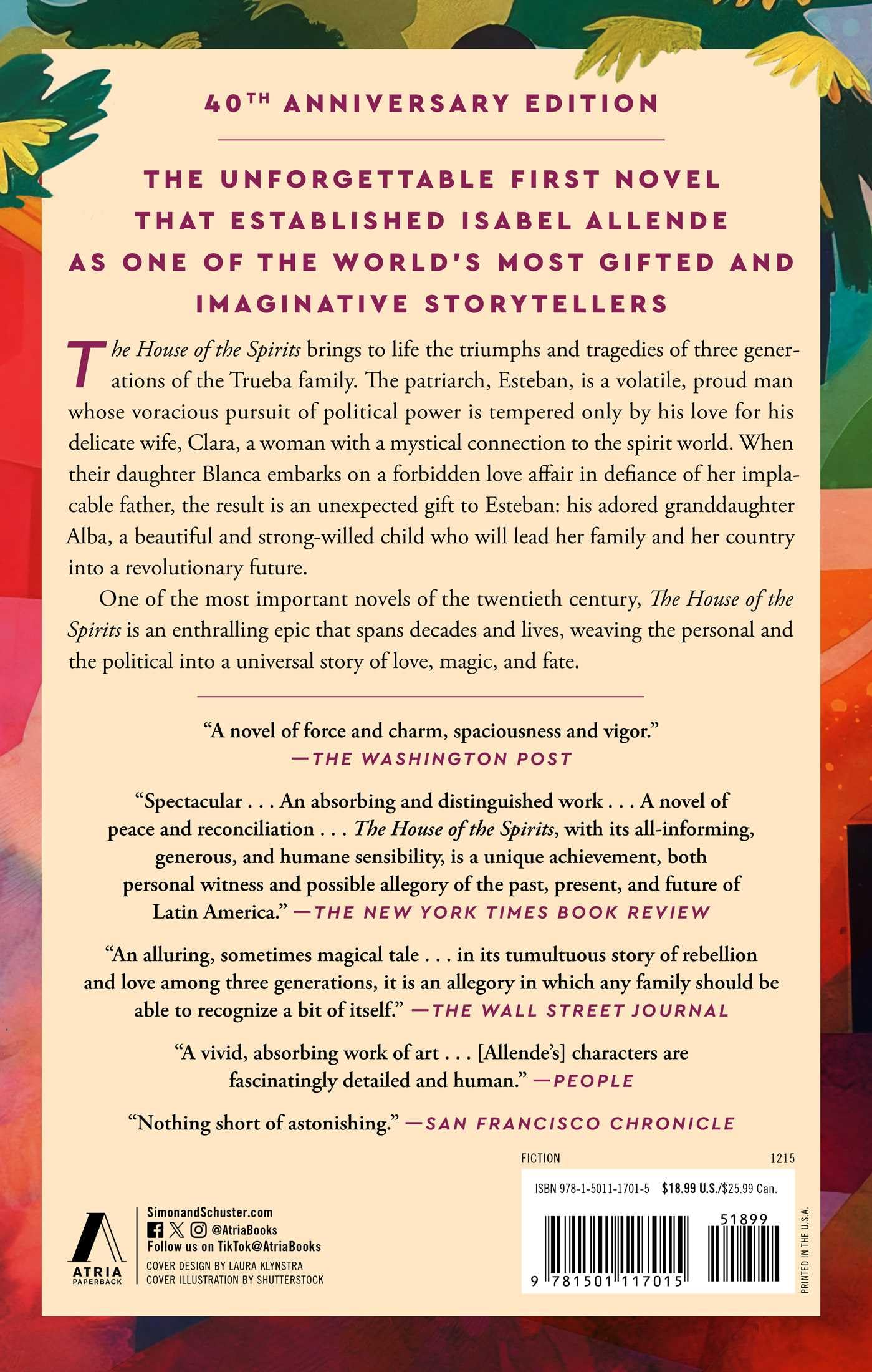Customer Services
Copyright © 2025 Desertcart Holdings Limited
Desert Online General Trading LLC
Dubai, United Arab Emirates




Full description not available
J**I
Magical, Lyrical, Epic, Political Family Saga!
I had a phase of obsession with Isabel Allende’s books back in my teens and thought I had read them all. Reading this, part of me felt like I had read this before, but the way it “hit” me, I also felt like perhaps I hadn’t. Of course, it could simply be that I didn’t have the emotional maturity back then to read it as I just did. In short, this novel is EVERYTHING! If you’re a fan of magical realism, this novel has that in spades. If you like domestic fiction with messy family drama, it’s there. If you like historical fiction, it’s there. If you like romance, star-crossed love stories galore! If you like political intrigue, lots of that is in here. The lyrical memoir style of writing in this amazing novel is absolutely captivating and yet immensely accessible to any reader.This novel tells the story of Esteban Trueba and his beloved otherworldly wife Clara del Valle and the way life, patriarchal decisions and the changing political face of their country affects three generations of Truebas. This is a love story, a political history, a family saga, and a story of black sheep and magic that is underpinned by the descent into fascism of a country. It is so pertinent for the world right now and is a familiar tale for anyone who’s ever lived under a dictatorship.Admittedly, this novel felt long. It never felt TOOO long but it IS telling the story of 3-4 generations, so there’s a lot of story. The writing is beautifully descriptive with lots of gorgeously-phrases sentences and quotes that are as creatively crafted as they are useful and pertinent. The novel is long but not a clause is casual, not a moment is wasted to move the story forward. The narrators are varied- from del Valle grandparents to family patriarch Esteban Trueba, to beloved granddaughter, Alba, to the author herself- there’s a lot of unlabeled jumps in the voice, but yet all the voices are distinct and you’re never confused or adrift as to what’s happening or who is doing what. This book is nearly 40 years old and it’s written in a way that isn’t politically-correct now or before. The heroes and villains aren’t straightforward, the character development is beyond amazing- you swing between love, hate, annoyance, pity, sympathy, anger, frustration, empathy, with the same characters. Equally, the story development is on point and this family packs a lot of experience and pain and life into 3 generations.Beware of potential triggers of which there are numerous from rape (including of minors), to physical assault to the abuses to persons living under a dictatorship and this feels very real and true to life because there isn’t an easy answer of justice. Even though this is a very heavy book and not a particularly uplifting one, it is incredibly meaningful and readable and you’re not left crushed. You’re left feeling like you’ve lived 3 generations of life with these people and have been through their ups and downs and you’re better for knowing them and learning from the pitfalls of their imperfect lives. This is a full circle novel so in that respect, this is a satisfying read even if not a joyous one. It is only because it is IA that I can believe this was her debut because honestly... What. A. Debut!
K**I
Powerful Family Drama
The Pablo Neruda quote that precedes Allende's The House of the Spirits asks, "How much does a man live, after all?/Does he live a thousand days, or only one?/ For a week, or for several centuries?" Allende goes on to write a graceful, powerful intergenerational saga focusing on the eccentric Trueba family which contemplates the workings of time and memory. A work that some would label "magical realism," The House of the Spirits includes several characters with supernatural abilities, and Allende's novel seems to purposely blend the past, present, and future in an attempt to challenge linear, logical notions of time. As Alba eloquently observes in the novel's epilogue, "I write, she wrote, that memory is fragile and the space of a single life is brief, passing so quickly that we never get a chance to see the relationship between events; we cannot gauge the consequences of our acts, and we believe in the fiction of past, present, and future, but it may also be true that everything happens simultaneously - as the three Mora sisters said, who could see the spirits of all eras mingled in space" (432).Indeed, the reader of Allende's novel is instructed to be attentive to chronology throughout. Alba, the granddaughter of Esteban and Clara (the Clairvoyant) Trueba, points out that she has arranged her grandmother Clara's notebooks, which were not in chronological order, so that a reader can follow the family's story. Alba and her grandfather Esteban narrate the story in turn (though usually Alba is at the helm), and both characters, narrating from the present, have knowledge of the family's history, and the sequence of events that is just unfolding for the reader through the novel. Therefore, our narrators often give clues to events that will occur later in the story and often refer back to earlier stories or details which become important later. More blatantly, the sort of circular or nonlinear representation of time in the novel is embodied in the supernatural storylines. Clara, the matriarch of the Trueba family, is a clairvoyant who has the ability to communicate with spirits, among numerous other psychic powers. Clara can foretell events (often tragic ones), and her ability to co-exist with spirits leads to the entrance of her newly deceased sister-in-law Ferula into "the big house on the corner," as the Trueba estate is called, and Clara's own appearance to the family after her death. All of Clara's psychic powers lend a magical feel to Allende's novel and futher contribute to the idea that the time of the memory and of the spirit are fluid and indefinite.The House of the Spirits raises many interesting questions about time, memory, and family, but it also presents those interested in gender studies much to think about. The patriarch of the Trueba family, Esteban, is a power-hungry, violent, self-righteous man who, while claiming to love his wife, angrily strikes her and regularly visits brothels. Before his marriage to Clara, Esteban makes it a habit to rape peasant girls in his hacienda Tres Marias, impregnating several of them with no concern for the children he has fathered. Despite his abominable character, he is central to the novel and even narrates parts of it. His granddaughter Alba also remains close with her grandfather at the end of the novel, and the reader is, in a sense, asked to sympathize with Esteban. On the other hand, the female characters rarely commit any serious offenses in the readers' eyes. Clara lives in another world much of the time, but all of the book's characters love her, and Blanca and Alba are extremely sympathetic characters. Blanca and Alba both devote their lives to love affairs with men who are involved in the Communist resistance (Esteban, father of Blanca and grandfather of Alba, eventually becomes a Senator and is a staunch advocate for the conservative right), and Alba is even drawn into political struggle (to the point of being arrested and tortured) because of her relationship with Miguel, a guerilla leader. Rosa, whose presence sort of haunts Esteban and the novel, but only slightly, is merely a beautiful creature. Women in the novel are given most of their power in the domestic realm (with the possible exception of Alba at some points), but are nonetheless the heart and soul of the novel and of the Trueba family. The women's stories are the ones that are, in my opinion, the most interesting to read. Also, I think it's important to note that Clara and Alba are characterized as creative spirits and writers in this novel. Although Esteban adds his own narration occasionally and gives Alba the idea to write down her family's story, the novel is primarily controlled by the stories of Clara's notebooks and Alba's narration. These female characters become the keepers and recorders of the family's history.The spirited Alba is a particularly intriguing character, and I found that her entrance into the novel (chapters 8 and 9) piqued my interest. When I first began reading the novel, I had a little trouble getting into it and quickly grew tired of the character of Esteban. The second half of the book was a much more interesting read for me, and I felt that the Epilogue provided a fitting conclusion to this story, though I found myself wishing I could read more about the lives of Blanca, Pedro Tercero, Miguel, and Alba when I closed the novel.
Trustpilot
5 days ago
3 weeks ago